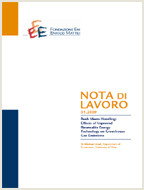Foreclosing Competition through Access Charges and Price Discrimination

Data
01.09.2009
01.09.2009
Autori
Ángel L. López, Patrick Rey
Codice JEL
L41, L51, L96
L41, L51, L96
Parole chiave:
Access Pricing, Entry Deterrence, Interconnection, Network Competition, Two-way Access
Access Pricing, Entry Deterrence, Interconnection, Network Competition, Two-way Access
Publisher
Economy and Society
Economy and Society
Editor
Fausto Panunzi
Fausto Panunzi
This article analyzes competition between two asymmetric networks, an incumbent and a new entrant. Networks compete in non-linear tariffs and may charge different prices for on-net and off-net calls. Departing from cost-based access pricing allows the incumbent to foreclose the market in a profitable way. If the incumbent benefits from customer inertia, then it has an incentive to insist in the highest possible access markup even if access charges are reciprocal and even in the absence of actual switching costs. If instead the entrant benefits from customer activism, then foreclosure is profitable only when switching costs are large enough.
